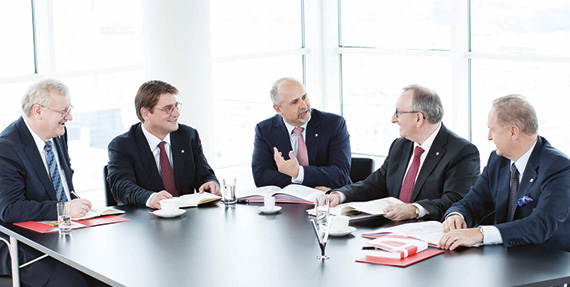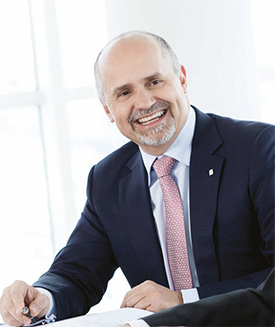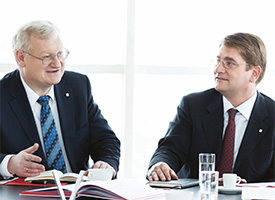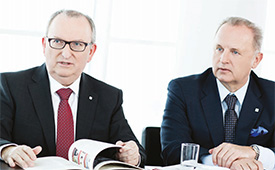
From left to right: Martin Simhandl, Peter Höfinger, Peter Hagen, Franz Kosyna, Franz Fuchs
“... 180 MILLION PEOPLE REPRESENT ENORMOUS POTENTIAL ... ”
Mr Hagen, this annual report uses the motto, “There are people behind every number”. What does that mean specifically for Vienna Insurance Group?
Hagen: It simply means that our success is based on people – our customers, employees, shareholders and partners. Confidence plays a very important role for a product you can’t actually touch. We could not exist without enjoying the confidence of our customers, each and every day. That confidence can only be won if our customers encounter service-oriented, competent employees. I believe this awareness defines us perfectly and would therefore like to stress this point in the annual report, because for me the idea captures the spirit and basis of our Company as a whole. Capital can be obtained, IT services can be purchased, property is basically interchangeable – employees are the true success factor for our Group. Their professionalism, performance, motivation and optimism represent what we are, and have been for close to 190 years. Since they, in the true sense of the word, embody our company in relationships with customers, one of our main objectives is to offer optimal training and advanced training possibilities, attractive career opportunities, and to support and challenge them as much as possible. This is also true of women, who are being specifically targeted for development in VIG.
Have you and the employees also made 2012 a year of success?

Peter Hagen
Hagen: One can definitely say that. In spite of quite a challenging environment, Vienna Insurance Group performed very well in 2012. We were once again able to significantly increase both premium volume and profits. Our premiums came very close to the EUR 10 billion mark for the first time. More than half of the premiums and profit came from the CEE region, which once again confirms that the decision to expand our business into the countries of Central and Eastern Europe in 1990 was correct. We continued to expand our market leadership in our core markets, further widening the gap between us and our international competitors. Our market share is now greater than 19% in these markets.
Höfinger: The insurance business was even more strongly affected by claims due to natural events in 2012 than in the year before. This includes the frost damage in the first half of the year, followed by a large number of storm events in the summer. This not only placed great demands on all of the Group units concerned to provide rapid claims processing, but naturally also increased total insurance payments, thereby having effects on our profits. We were nonetheless able to further increase our earning power.
What do the figures for this look like?
Simhandl: As mentioned, Group premiums came close to the EUR 10 billion mark for the first time. Specifically, they rose by 9.0% to EUR 9.7 billion. Our profit before taxes was EUR 587 million, 5.1% higher than the previous year. Profit after tax and minority interests even increased by approximately 10%. In spite of the increase in storm claims, the combined ratio also remained at a very positive level of 96.7%. With an increase of around 14% to EUR 5.8 billion, equity has also shown pleasing growth. Our solvency ratio has, therefore, risen further and is considerably above 200%.
As mentioned previously, the environment was rather difficult in 2012. What did that mean in concrete terms for Vienna Insurance Group?
Kosyna: On the one hand, the general economic environment was rather subdued, and we and the entire industry also felt that in the insurance business. New car registrations are not particularly dynamic and we are seeing intensive price competition for motor vehicle insurance in some markets. When people have to save, they naturally also examine and question their insurance expenditures more carefully. They need sound advice in this case about the importance of good coverage, particularly in difficult economic times.
In Austria, the situation for life insurance was further exacerbated by what, in my opinion, were rather short-sighted fiscal policy measures. Increasing the minimum period for preferential tax treatment of single-premium policies from ten to 15 years and cutting the subsidy for government sponsored pension plans in half significantly reduced the attractiveness of life insurance products.
Simhandl: Capital market performance was very good in 2012, particularly in the second half of the year. Falling yields and declining credit risk premiums had a highly positive effect on fixed-income investments. Equity market performance was also very good at the end of the year. VIG’s financial result recorded outstanding growth of 33% over the previous year in this environment. The euro crisis eased considerably over the course of the year, although it is still too early to give the all-clear. We believe, however, that we are well prepared for further uncertainty due to our conservative investment policy.
With respect to operating performance, were there any particularly noteworthy developments in individual lines of business or markets?
Fuchs: Mr Kosyna has already mentioned that the life insurance business was very difficult last year, particularly in Austria. I would like to stress, however, that our international cooperation with Erste Group proved its value in precisely this area.
Unlike Austria, the Polish market grew dramatically in this segment. Demand for life insurance is strong there, and our Group companies were successful in taking advantage of this opportunity. As a result, premiums in Poland broke through the EUR 1 billion mark for the first time in 2012, and we also achieved an attractive increase in profits of 14.2%. The situation continues to be very challenging in Romania. Some market participants are creating intense price competition, particularly in motor vehicle liability insurance. We are, however, not joining in the dumping by our competition and we are maintaining our disciplined price policy. In spite of these difficult conditions, we were able to remain number one in Romania.
What are your general advantages in the market?
Höfinger: Our recipe for success can be summed up in one word: customer-orientation. We speak the language of our customers, have a dense network of branches and branch offices to create the best possible presence throughout each market and use established brands that customers are familiar with – what we call our multi-brand strategy. In addition, we purposely use a variety of distribution channels and place great importance on good relationships with our distribution partners.
We are familiar with the market and can therefore offer exactly what the market wants. Once again, this brings us back to the people who make the difference for our business success. Our customers are people whose needs and opportunities we have to know, and they encounter other people, our employees, who are well trained and motivated, and strive to offer optimal solutions and individually tailored service. At the same time, it is only natural that we also rely on innovative products and services as well as state-of-the-art tools.

From left to right: Martin Simhandl, Peter Höfinger
Efficiency is also an important
success factor ...
Simhandl: Of course, and that applies to operational processes as well as our corporate structure. We work continuously on both, since it is our stated goal to generate our earnings in the insurance business without having to rely on investment results. We therefore examine every possibility to increase our efficiency and, therefore, earning power. We merged Group companies in Poland, Romania and Bulgaria to optimise our structure, and concluded these processes in the year just ended. Preparations are under way for another merger between Helios and Kvarner in Croatia. Depending on the specific situation in a country, some countries also have their own cost reduction programmes.
Social issues have always been very important for your companies. What is happening in this area at the moment?
Hagen: It is self-evident that a company whose roots reach back almost 190 years would have a long-term and, in particular, sustainable perspective. That includes a high level of social responsibility. We have been socially involved in a variety of ways in past years and decades. Our principal shareholder, Wiener Städtische Versicherungsverein, promotes numerous initiatives and provides continuous support for the Group’s activities. The “Social Active Day” has certainly been one of the most important projects in past years. The Company generally allows employees to take one day off during the year to perform social activities in a wide variety of institutions. 4,195 working days were provided for volunteer social activities in 2012 alone, corresponding to around 19 man-years of time that we provided free of charge for the collective good. In 2011, nine countries participated in the Social Active Day, and in 2012 there were already 17 countries involved, which means the initiative is truly Group-wide.
Kosyna: 2012 was also the first time that the Günter Geyer Social Active Award for social projects was conferred. The award went to three Group companies that had done something special in the social area. The winner was Kooperativa in the Czech Republic. Social involvement has been a part of the life of our Czech colleagues for many years. Among other things, they work in cooperation with “Helping Paws”, an organisation that trains and distributes assistant dogs for disadvantaged individuals. The Hungarian company Union Biztosító also received an award for its involvement in connection with the Bátor Tábor Camps for chronically ill children. The Croatian company Helios received third prize for its involvement with the St. Tereza orphanage. In addition to the awards, the companies also received a total of EUR 100,000 to promote their social projects.

From left to right: Franz Kosyna, Franz Fuchs
Fuchs: The “Carer with a Heart” campaign in 2012, carried out by Wiener Städtische in cooperation with the Austrian Health and Nursing Care Association (ÖGKV), Erste Bank and the Austrian Ministries of Social Affairs and the Economy, was also an important step in building awareness. As a responsible insurance company, I think it is extremely important for us to point out the significance, not to mention social explosive force, that the topic of retirement and nursing care provisions could have for our society.
Mr Hagen, you have been the head of the Vienna Insurance Group Managing Board for close to a year. What about the strategic course being followed – have any changes been made?
Hagen: There has been no change to our principles, of course, since Vienna Insurance Group is following a successful path – and will continue on this path in the future. This does not mean we won’t observe the market carefully and take advantage of opportunities. I would put it this way: We will remain true to our principles, but will be flexible and react quickly to new developments.
We have made a clear commitment to Austria and Central and Eastern Europe as our “natural” home market, as we are convinced of the high potential offered by this region. The CEE region has often been viewed with a great deal of scepticism lately, and I consider this to be excessively pessimistic. Of course, growth can be accompanied by breathing periods, but the desire for convergence and motivation of the people in the CEE region remains unchecked and is often overlooked in the forecasts. They simply want to improve their economic situation and create prosperity. In addition, 180 million people represent not only an enormous number of potential customers, but also a large pool for well trained and motivated employees. Moreover, we further strengthened our commitment to the region with two additional purchases in the year just ended. After the Polish life insurance company Polisa, which we purposely used to better exploit the dynamic life insurance market in Poland, we became the market leader in Macedonia by acquiring a majority interest in QBE Makedonija.
Aside from the clear focus on the CEE region, what are the key elements of your strategic orientation?
Hagen: There are several very clear principles that have proven themselves in the past and which we continue to rely on. We are an insurance company, nothing else, and we therefore concentrate on our underwriting result. This allows us to avoid the pressure of having to assume too much risk in the investments area. Following the motto, “think globally, act locally”, we rely on local entrepreneurship because our local management and employees are the ones who know our customers, their needs, our distribution partners and the market the best. Our multi-brand strategy and multi-channel distribution are aimed at creating the closest possible relationships with our customers. Our well-established cooperation with Erste Group is another key element. And, last but not least, our conservative investment policy forms a solid foundation for our financial stability, which is intended to create confidence among our customers and employees as well as shareholders.
With respect to shareholders, how was your capital market performance?
Simhandl: I think our shareholders will be satisfied with a price increase of more than 30% in the year just ended, even though there were some dry spells during the course of the year. However, in a time of constantly changing sentiment and general uncertainty, caution is needed when looking to the future. Our goal, in any case, is to offer our shareholders sustainable long-term performance. With respect to the dividend, we are maintaining our policy of distributing at least 30% of Group profit after taxes and minority interests to our shareholders.
Finally, the question that everyone wants to ask: What is your outlook for 2013?
Hagen: As planned, we grew faster than the market average in our core markets in 2012, and that also remains our goal for the future, as does a further increase in profitability. Although there is nothing we can do about the economic environment, which all the forecasts predict will continue to show little growth momentum, we will fully dedicate ourselves to doing everything possible to achieve further profitable growth. We have shown in previous years that we can also achieve this in a difficult environment.
And where will VIG be in ten years?
Hagen: Vienna Insurance Group will continue to be the largest insurance group in Austria and will be the most profitable insurance group in the CEE region – and even more women will be in management positions than today.

